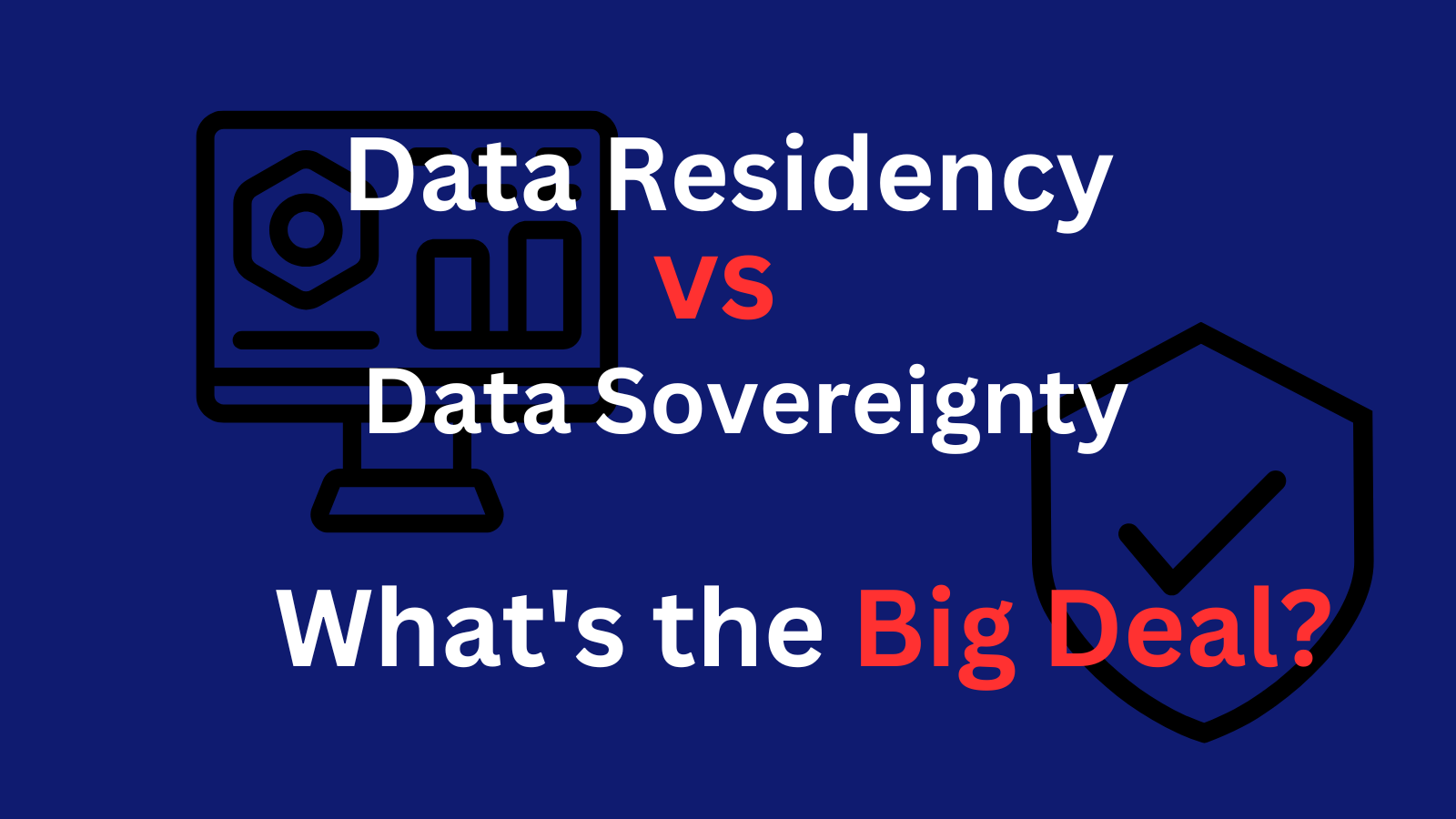Data Residency vs Data Sovereignty- What’s the Big Deal?
Data residency and data sovereignty are very important ideas in cloud computing and managing data. Though they are sometimes used as if they mean the same thing, they have different meanings and rules.
Data residency is all about where data is physically or geographically kept. Often, businesses have to follow certain rules that say data must be stored within specific borders. This is because local laws and regulations require it, making it easier for companies to comply with these laws and protect personal information from being accessed by foreign governments.
On the other hand, data sovereignty is more about the legal control over data, not just where it’s stored. It means that data is subject to the laws of the country where it is collected, no matter where it is stored. This gives the country’s laws power over how the data is used, shared, and handled, which can be quite complex in today’s global digital world.
Understanding the differences between data residency and data sovereignty is very important for businesses that work across different countries. If a company doesn’t follow these laws, it could face serious legal problems, large fines, and damage to its reputation. Knowing what each term means and how they relate to each other can help businesses deal with the complex world of international data laws. This introduction leads to a deeper look at how these regulations impact global business and what strategies companies can use to ensure they comply properly.
What is Data Sovereignty?
Data sovereignty is a key idea in today’s digital world. It means that any information collected is controlled by the laws of the country where it was gathered. This rule determines how data is managed, stored, and shared, making sure that all digital information follows the local laws of the place it comes from. The main point of data sovereignty is that a country has control over its data, no matter where the data handling companies or third-party processors are based.
Data sovereignty has big effects, especially for large companies that work in different countries with different laws. When data moves across borders, it’s not just moving from one server to another it’s moving through different legal areas, each with its own rules about data privacy, security, and how it can be used. This gets even more complicated when countries have very strict laws, like the General Data Protection Regulation (GDPR) in the European Union, which has tough rules on how data must be protected and transferred.
In real-world applications, data sovereignty affects how companies make decisions about their data systems, follow rules, and run their operations worldwide. Companies need to carefully understand and follow these laws because not doing so can lead to big fines, and legal problems, and could even harm their relationships with customers and partners. Understanding data sovereignty isn’t just about following the law; it’s also about managing the business wisely and keeping operations trustworthy in the global digital market.
The importance of data sovereignty
The importance of data sovereignty is really big, especially today when data leaks and cyber threats are becoming more common. Sovereignty means that a country has the final say over the data created within its borders. This is essential for keeping the nation secure, its economy stable, and protecting the privacy of its people. This control isn’t just about protection; it’s also about countries enforcing their own rules and standards on how data should be handled, including issues of privacy and security.
For businesses, the importance of data sovereignty has two main points. First, following local data laws is a must for legally operating a business. Companies that work with or handle data from places with strict data sovereignty laws need to make sure their data handling meets these local rules. If they don’t, they could face big fines, legal issues, and a loss of trust from their customers.
Secondly, data sovereignty impacts a company’s reputation. In a time when people are very concerned about data privacy, showing that a company follows strict data sovereignty laws can improve its image. It reassures customers and partners that the company takes data protection seriously and respects local laws and customs. This can be especially attractive to customers who are careful about where and how their data is handled.
Moreover, understanding and following data sovereignty can give businesses a competitive advantage. It helps with better risk management and smarter decisions about where to store, process, and transfer data. Companies that understand the complicated rules of data sovereignty can position themselves better in international markets. This leads to smoother operations and builds trust with people and organizations around the world.
What are the Common challenges faced in data sovereignty?
Navigating the complex world of data sovereignty is full of challenges for organizations, especially those that operate globally. One of the main problems is the variety of legal rules in different countries. Each country has its laws and regulations about data protection, privacy, and sovereignty. This diversity makes it hard for multinational companies to use a single strategy for managing data, and they often need to create specific plans that comply with each country’s laws.
Another big challenge is the technological complexity involved in maintaining data sovereignty. Data must not only be stored according to local laws but also managed and processed in ways that respect sovereignty principles. This often requires advanced technological solutions, like local data centers or sophisticated data residency services that can sort and handle data according to specific geographic and legal rules. Setting up these technologies can be expensive and needs constant upkeep and updates to remain compliant as laws change.
The fast changes in laws about data protection and sovereignty also create challenges. Laws like the GDPR in Europe or the CCPA in California are always being updated to meet new privacy needs and keep up with technology. Companies need to stay flexible and well-informed, often spending a lot of resources on legal compliance to keep up with these changes.
Additionally, enforcing data sovereignty can lead to conflicts between different countries’ laws, especially when one country’s data protection laws clash with another’s demands for data access. For example, a U.S. company working in Europe must follow European data protection laws, but it might also need to meet U.S. laws that require it to share certain data. Solving these conflicts often involves careful negotiations and sometimes changing data governance policies to satisfy the legal requirements of different countries without breaking any laws.
These challenges highlight the need for strong data governance frameworks and a proactive approach to legal compliance, underlining how important it is to understand and apply data sovereignty principles effectively.
What is data residency?

Data residency is about storing data on a server located within a certain geographic area, usually because of legal rules, policies, or customer needs. Unlike data sovereignty, which is about who legally controls the data, data residency focuses on where the data is physically stored. This is important for companies that must follow specific national laws requiring certain data to stay within the country’s borders.
The reason for data residency rules often relates to concerns about privacy, controlling access, and who has legal authority over the data. Many countries have data residency laws to keep sensitive information safe from foreign spying and misuse by those outside their legal authority. For example, a country might insist that all personal data about its citizens be stored within its own borders to make sure it’s protected by its own privacy laws, not those of another country.
For businesses, dealing with data residency can be both challenging and beneficial. On one side, following data residency rules can be costly and complicated. It might mean setting up or hiring data centers in certain countries, which can be expensive and difficult, especially for smaller companies or those without much physical presence in the needed locations.
On the other side, sticking to data residency rules can give businesses an edge in markets where people are very concerned about data privacy and security. By storing data locally, companies can build trust with local customers and stakeholders. This compliance is not just about following the law; it also plays a big role in earning customer loyalty and trust in places with strict data protection rules.
Overall, understanding data residency is crucial for any business that deals with data across international borders. It makes sure that companies are not only following local data laws but also respecting the preferences and expectations of their customers when it comes to data handling and protection.
The importance of data residency
The strategic operation of any business and regulation compliance predicates data residency of great importance. Multiply its importance in scenarios where firms operate in several jurisdictions, each with possibly different laws and regulations related to data protection and privacy. Data residency ensures the companies in question meet local legal standards so that they can continue operating within legality.
First, compliance with the data residency regulation is of immense importance not to draw legal penalties to the company. Most countries’ rules will imply that such data is stored domestically for regulatory oversight and legal enforcement. The kinds of punitive actions that can be taken, including heavy fines, legal sanctions, and other outcomes, therefore are bound to have profound impacts on the financial health and branding of a company.
Besides, data residency is inextricably linked to data security and the assurance of privacy. Given such heavy importance, storage of data locally reduces the exposure risk to jurisdictions with privacy protection that may be more or less lax. This is somewhat limited to potential robust unauthorized access and data breaches that are harder to deal with when data spans many legal frameworks and security standards. This is a localized approach to how data are stored, which helps develop a great deal of trust from the customers who are growingly concerned about the privacy and security of their data.
On the other side, the residency of data also ensures quick retrieval of data and, moreover, it reduces latency in access to data.
Local storage will ensure that data is provided at or near locations where it is being used, thereby enhancing the performance of cloud service and applications. Looking from this point, local storage could be of much help, mainly for given industries like financial services or healthcare that have speed and efficiency as their essence.
This will consolidate the positioning in business relations and market positioning, showing commitment to the strategic data residency. It provides assurance to local customers and partners, which brings out the confidence that the company has an obligation toward national standards at both the commitment and compliance stages concerning the respect and protection of local data, which might be decisive in business negotiations or partnership decisions. In essence, data residency is extremely important, and its use goes far beyond mere compliance; it is one of the major driving factors in strategic data governance that would improve security, increase performance, and breed trust among stakeholders. Thus, it is of great essence that organizations functioning in the global market understand and ensure viable data residency as part of their business strategies to remain in the industry.
What are the Common challenges faced in data residency?
Navigating data residency requirements has, therefore, been seen as a devil in the details to the organizations, more so those operating on a global scale. The complexity of adherence, together with so many different local laws, combined with changing technology and business operations, can derail the best-laid business strategies and IT infrastructure.
Among the primary challenges is handling a multi-regulatory environment. Each country will have its own set of requirements for residency. They also tend to be very different from each other, thus making their tapestry hard to put in place. Global companies have to cope with fragmentation related to their data storage solutions. All are specially designed to be in compliance with the local laws and regulations of the countries where they are running their operations. At the same time, there may be an increase in operational costs along with more complexity in the management of data.
Beyond these, of course, lie all the technological challenges considered from an infrastructure point of view. The position of data centers in different countries, being localized, implies large investments in acquiring physical infrastructure, in terms of IT resources, and in any case, in their maintenance. Bringing together such divergent systems to the level of high standards of data security and efficiency would be a mammoth exercise that would require very sophisticated technology solutions and highly skilled personnel.
Finally, data residency poses logistic problems in the management of data. On the other hand, it brings about complexity in accessing and processing the said data, as there are necessities for segregation and localization of the data storage. For example, where data is stored in several locations, it may present challenges related to ensuring that there is timely and relative access from different regions. This may impact the performance of cloud services and applications, ultimately causing inefficiency and possible disruption of the user experience.
Legal and contractual issues further compound data residency compliance. This is especially important since organizations must ensure that their data processing practices comply with local legislation and agreements on international data protection, and meet client and partner expectations in this respect. This always requires strong legal knowledge and the ability to draft contracts and service-level agreements that don’t bring about any legal disputes and, in addition, are legally enforceable in all jurisdictions.
Lastly, the quick change of data protection laws implies that companies have to stay supple and ready to change their data residency strategies time and again. Staying abreast with the quickly changing regulations compels companies to continuously monitor these changes and be proactive, adding another layer to governance and compliance efforts.
Overall, the importance of residency simply leaves the challenges open to a thoughtfully applied strategy and solid infrastructure combined with proactive compliance and data management.
In conclusion
All these within the setup of the modern-day digital era, data sovereignty, and residency are both paramount doctrines that hold a rather significant weight over the management, protection, and regulation of data crossing borders. Where data sovereignty looks at jurisdictions of data according to law within a country, data residency looks to enforce that physical storage of data be according to geographical boundaries. Both are critical for ensuring compliance with diverse and ever-changing global regulations, securing data against unauthorized access, and maintaining trust with customers concerned about privacy. All of these requirements are quite demanding for companies to follow, from the complexity associated with navigating more than one legal framework, to the technological requirements of managing distributed data centers. With these challenges, framing strong data governance frames, the organization would be in a position to achieve high operational effectiveness, guard against reputational integrity, and have the opportunity to gain competitive advantages in the global marketplace. Data continues to become of even greater value, and understanding and implementation of this concept of data sovereignty and residency can never be overemphasized in modern business strategies.
FAQs
What is data sovereignty?
Data sovereignty refers to the principle that data is subject to the laws and regulations of the country where it is collected. This legal framework affects how data is handled, stored, and transferred, emphasizing national control over data.
How does data residency differ from data sovereignty?
While data sovereignty focuses on the legal authority over data, data residency concerns the physical location of data storage. Data residency requirements mandate that data be stored within specific geographical boundaries to comply with local laws.
Why is data sovereignty important for businesses?
Data sovereignty is crucial for compliance with local data protection laws, ensuring that an organization’s data practices align with the legal requirements of the countries they operate in. This helps avoid legal penalties and builds trust with customers.
What challenges do companies face regarding data sovereignty?
Companies must navigate varying and often conflicting national laws, implement complex technological solutions, and stay updated on legal changes to ensure compliance with data sovereignty laws.
Can data residency affect the performance of my business applications?
Yes, data residency can impact application performance, as data stored far from its point of use can increase latency. However, local data storage can improve speed and efficiency, crucial for businesses that require quick data access.







